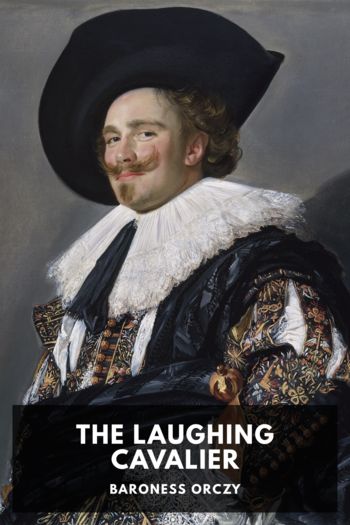The Laughing Cavalier, Baroness Orczy [the beginning after the end read novel TXT] 📗

- Author: Baroness Orczy
Book online «The Laughing Cavalier, Baroness Orczy [the beginning after the end read novel TXT] 📗». Author Baroness Orczy
“You want to get your daughter back, do you not, old friend?” urged Mynheer van der Meer the burgomaster.
“Of course,” assented Beresteyn feebly.
“And you want to get her back as quickly as possible,” added the pompous treasurer of the Oudemannenhuis.
“As quickly as possible,” reiterated Beresteyn vaguely.
“Very well then,” concluded the burgomaster, in tones of triumph which suggested that he had gained a great victory over the obstinate will of his friend, “what you must do, my good Beresteyn, is to attend an informal council which I have convened for this afternoon at the Lame Cow and whereat we will listen to all the propositions put forward by our fellow-townsmen for the speedy capture of those vervloekte brigands and the liberation of your beloved daughter.”
In the meanwhile an untoward accident had momentarily arrested the progress of the original band of volunteers who, under the leadership of Nicolaes Beresteyn, had started quite early in the morning on the Groningen route in pursuit of the sea-wolves. Nicolaes, namely, on remounting his horse after a brief halt at Bloemendal, had slipped on the snow covered ground; his horse jumped aside and reared and, in so doing, seriously wrenched Nicolaes’ right arm, almost dislocating his shoulder and causing him thereby such excruciating pain that he nearly fainted on the spot.
Further progress on horseback became an impossibility for him, and two of the volunteers had much difficulty in conveying him back to Haarlem, where, however, he displayed the utmost fortitude by refusing to waste his time in being examined and tended by the bonesetter, and declaring that since he could not take an active part in the campaign against the vervloekte malefactors he would give every moment of his time and every faculty he possessed for the organisation of an effective corps of soldiery capable of undertaking a successful punitive expedition.
He joined his father in the taproom of the Lame Cow, and though he was obviously in great pain with his arm and shoulder which he had hastily and perfunctorily tied up with his sash, he was untiring in his suggestions, his advice, his offers of money and of well-considered plans.
Unbeknown to anyone save to him, the Lord of Stoutenburg sat in a dark recess of the tapperij deeply interested in all that was going on. He knew, of course, every detail of the plot which Nicolaes Beresteyn had hatched at his instigation and—hidden as he was in his obscure corner—it pleased his masterful mind to think that the tangled skein of this affair which these solemn and pompous burghers were trying to unravel had been originally embroiled by himself.
He listened contemptuously and in silence to the wild and oft senseless talk which went on around him; but when he caught sight of Diogenes swaggering into the room in the wake of the painter Frans Hals he very nearly betrayed himself.
Nicolaes Beresteyn too was dumbfounded. For the moment he literally gasped with astonishment, and was quite thankful that his supposedly dislocated shoulder furnished a good pretext for the string of oaths which he uttered. But Diogenes, sublimely indifferent to the astonishment of his patron, took a seat beside his friend at one of the vacant tables and ordered a substantial supper with a bottle of very choice wine wherewith to wash it down, all of which he evidently meant to pay for with Nicolaes’ money. The latter could do nothing but sit by in grim silence while the man whom he had paid to do him service ate and drank heartily, cracked jokes and behaved for all the world as if he were a burgher of leisure plentifully supplied with money.
Time was going on: the subject of the expedition against the sea-wolves had been fully discussed and certain resolutions arrived at, which only lacked the assent of the burgomaster sitting in council and of Cornelius Beresteyn—the party chiefly interested in the affair—in order to take effect on the morrow.
Gradually the taproom became less and less full: one by one the eager and inquisitive townsfolk departed in order to impart what news they had gleaned to their expectant families at home.
Nicolaes Beresteyn, inwardly fuming and fretting with rage, had been quite unable to stay on quietly while Diogenes sat not twenty paces away from him, wasting his patron’s time and money and apparently in the best of humours, for his infectious laugh rang from end to end of the raftered room; he had soon assembled a small crowd of boon-companions round his table, whom he treated to merry jests as well as to Mynheer Beek’s most excellent wine; but when he leaned forward bumper in hand and actually had the audacity loudly to pledge the noble Beresteyn family and to wish the heroic Nicolaes speedy mending of his broken bones, the latter rose with a muttered curse and, having taken a curt farewell from his friends, he strode glowering out of the room.
The Lord of Stoutenburg—as unobtrusive and silent as was his wont—rose quietly a few minutes later and followed in the wake of his friend.
XXII A Double PledgeCornelius Beresteyn had now only a few of his most intimate friends beside him, and when Frans Hals had finished his supper he ventured to approach the rich patron of arts and to present his own most respectful expressions of sympathy.
Softened by grief the old man was more than usually gracious to the artist.
“ ’Tis a bitter blow, my good Hals,” he said dully.
“Please





Comments (0)